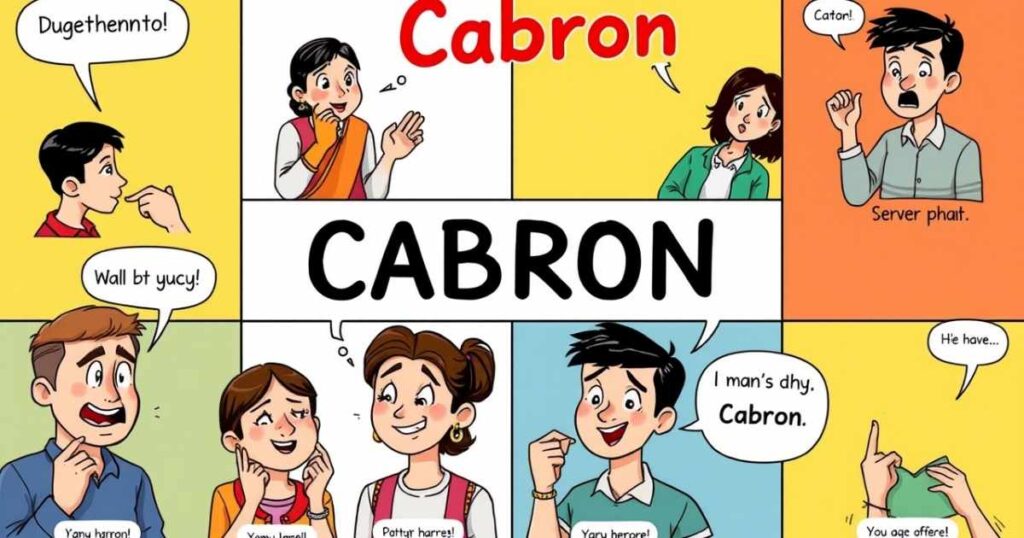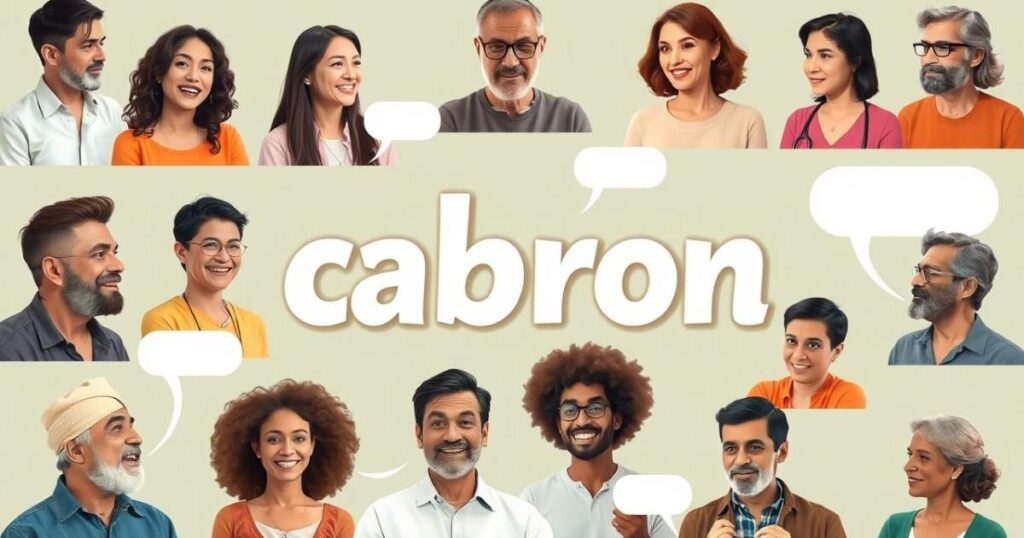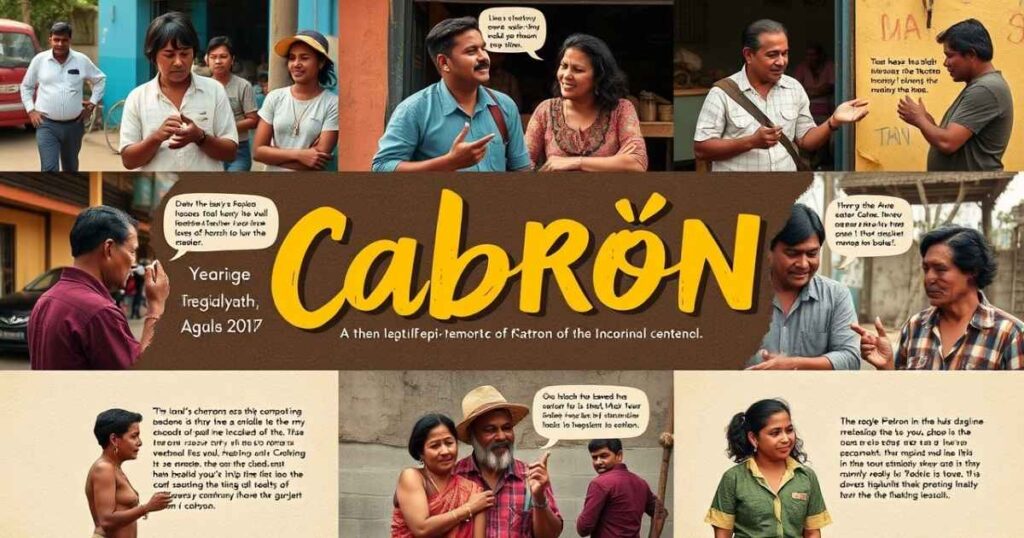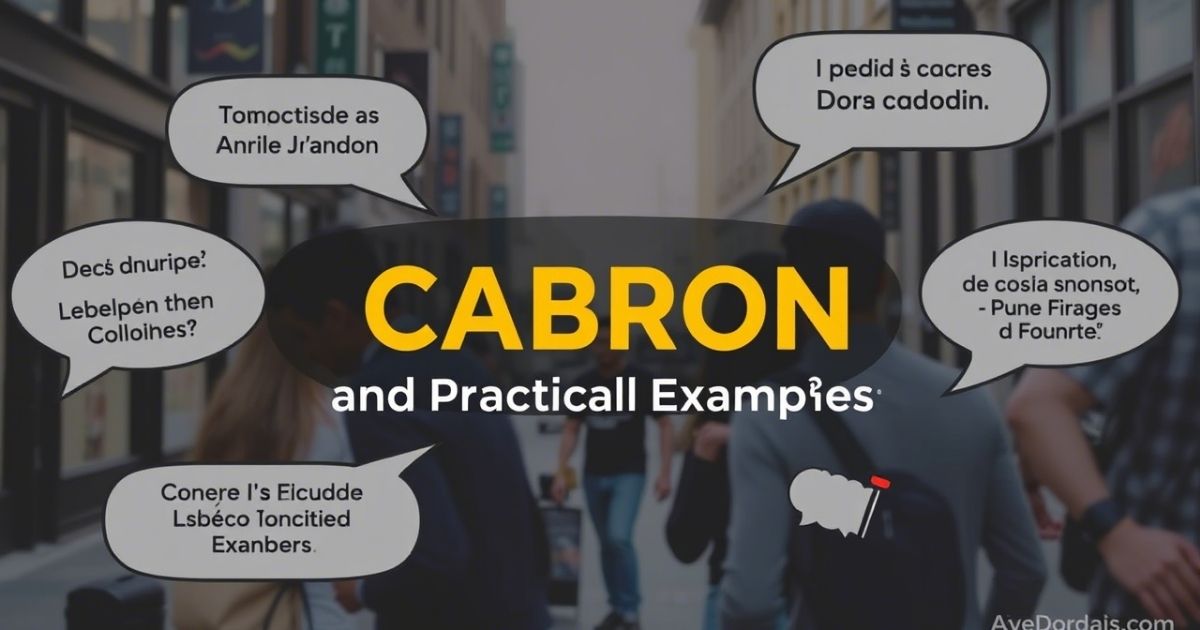Cabron is a Spanish word with various meanings, depending on the context and tone used. In its most common sense, cabron is an insult that can translate to “jerk” or “bastard” in English. However, the cabron meaning can change in a more casual or friendly setting, where it could just mean “dude” or “bro.” It’s important to understand the context when using cabron to avoid offending someone. The word can also be found in different forms, such as cabrona, the feminine version, which can mean “bitch” or “a woman who has been unfaithful.”
If you’re wondering how to translate cabron to English, it can vary. The cabrona meaning in English could be harsh, depending on how it’s said. Sometimes, cabronita meaning refers to a playful or affectionate nickname, and cabrona mean can imply someone who’s tough or powerful. For a different take, you might also come across al carbon translation, referring to grilled food, showing the diversity of the word in Spanish!
What Does Cabron Mean?
“Cabron” is a Spanish slang term with various meanings depending on the context and country. In some places, it is used as a playful insult between friends, meaning “idiot” or “fool.” However, in other regions, it can carry a more offensive tone, referring to someone who is being deceived or taken advantage of.
The term “cabron” also has its roots in Spanish-speaking cultures, where it originally referred to a “goat,” which symbolizes someone who is easily cheated on or disrespected. Over time, the meaning evolved to include a variety of insults, from mild to severe, depending on how it’s said.
While some use “cabron” casually among friends, others might find it deeply offensive. It’s essential to understand the context and tone when someone uses this word to avoid misunderstandings, especially when speaking with people from different cultural backgrounds.
Common Uses and Examples
Here are some common uses and examples of regional language differences:
- “Soda”
- United States: “Can I get a soda with my burger?” (referring to a sweet carbonated drink).
- Mexico: “¿Me das un refresco, por favor?” (asking for a sweet carbonated drink, typically called refresco).
- Canada: “Do you want a pop with your fries?” (use of pop instead of soda, common in central and eastern regions).
- United States: “Can I get a soda with my burger?” (referring to a sweet carbonated drink).
- “Tea”
- United Kingdom: “Fancy a cup of tea?” (refers to the traditional hot beverage, commonly consumed in the afternoon).
- United States: “Do you want some iced tea?” (referring to a chilled version, especially popular in the southern U.S.).
- Australia: “How about a cup of tea?” (similar to the UK, but also used informally for the evening meal, “tea” meaning dinner in some regions).
- United Kingdom: “Fancy a cup of tea?” (refers to the traditional hot beverage, commonly consumed in the afternoon).
- “Apartment”
- United States: “I just moved into a new apartment.” (the most common term for a rented living space).
- United Kingdom: “I live in a flat.” (the typical British term for an apartment).
- Australia: “I’m renting an apartment.” (often interchangeable with “flat,” but “apartment” is more common in urban areas).
- United States: “I just moved into a new apartment.” (the most common term for a rented living space).
- “Chips”
- United States: “I’m going to grab some chips for the party.” (refers to thin slices of fried potato, commonly called potato chips).
- United Kingdom: “I’ll have some chips with my fish.” (refers to what Americans call fries; thicker fried potatoes).
- Canada: “Want some chips with your sandwich?” (similar to U.S. usage, referring to potato chips).
- United States: “I’m going to grab some chips for the party.” (refers to thin slices of fried potato, commonly called potato chips).
- “Vacation”
- United States: “We’re going on vacation to the beach.” (common term for a holiday or trip).
- United Kingdom: “I’m going on holiday next week.” (uses holiday rather than vacation).
- Australia: “We’re heading on a holiday up the coast.” (similar to the UK, holiday is the preferred term).
- United States: “We’re going on vacation to the beach.” (common term for a holiday or trip).
The Different Meanings of Cabron

Understanding the word cabron requires a bit of cultural insight. In some contexts, it’s used as an insult; in others, it’s friendly or even admiring. Here’s a breakdown of its primary meanings:
1. Cabron as an Insult
The most common use of cabron in Spanish-speaking countries is to call someone a jerk, a “bastard,” or even an “asshole.” It’s the word you might hear when someone is frustrated or annoyed.
Example:
Ese tipo es un cabrón, siempre se aprovecha de los demás.
Translation: “That guy is such a jerk; he always takes advantage of others.”
This use of cabron has a strong negative tone. In some countries, like Mexico, it can also mean “cuckold” (a man whose partner has been unfaithful), which is why you’ll want to be careful about using it around people you don’t know well.
2. Cabron as a Friendly Term
Among friends, cabron can be a term of affection, similar to “dude” or “bro” in English. In this case, it’s more about camaraderie and less about being offensive.
Example:
¿Qué onda, cabrón? ¡Hace rato que no nos vemos!
Translation: “What’s up, dude? Haven’t seen you in a while!”
This friendly use of cabron is common in casual, relaxed conversations, especially in Mexico, where friends use it to greet each other without any negative intention.
3. Cabron as a Compliment
Believe it or not, cabron can also mean something positive! When someone is good at something or pulls off something impressive, they might be called a “cabron” admiringly.
Example:
Ese cabrón sí sabe hacer negocios.
Translation: “That guy knows the business.”
Here, cabron suggests that someone is skilled, sharp, or capable—someone to be respected or admired. It’s a form of recognition for someone’s competence or ability.
Understanding the different meanings of cabron depends on the tone and context, so be mindful when using it, especially in unfamiliar settings.
How to Use Cabron in a Sentence
Now that we’ve covered the meanings of cabron, let’s look at how it’s used in everyday sentences.
Depending on your tone and the context, cabron can carry different meanings, so here are some practical examples:
Damaging (Insult):
Juan siempre hace lo que quiere, sin importar a nadie. Qué cabrón.
Translation: “Juan always does whatever he wants, without caring about anyone. What a jerk.”
Positive (Admiration):
Ganaste el partido tú solo, ¡eres un cabrón!
Translation: “You won the game by yourself you’re amazing!”
Neutral (Friendly):
Oye, cabrón, ¿quieres ir a comer algo?
Translation: “Hey, dude, wanna go grab something to eat?”
Understanding cabron this way helps you know when it’s OK to use it and when it might be too strong or inappropriate. The key is always the tone, the relationship with the person, and the context in which you use it.
Historical Evolution of Cabron
The Cabron has a rich and fascinating historical evolution that traces back centuries. Initially, the term was used in various cultures, with different meanings ranging from a simple nickname to a more complex social label. Over time, it became associated with specific social groups, reflecting societal values and attitudes. This transformation was influenced by both local customs and external factors, including the migration of people and the spread of different languages.
As the centuries progressed, the Cabron took on a more nuanced role within literature and folklore. It became symbolic in different narratives, often embodying qualities of strength, rebellion, or mischief. The term’s usage continued to evolve as it was adopted into everyday speech, influencing modern cultural perceptions. Today, the legacy of the Cabron is embedded in contemporary slang, maintaining its relevance in various social contexts.
Regional Perspectives: Comparing Usage
- United States: “Soda”
Commonly used in most of the U.S. to refer to a sweet carbonated beverage, particularly in the Northeast, West, and South. In some areas, it’s a neutral, generic term like “soft drink.” - United Kingdom: “Soda”
Rarely used, with the term “fizzy drink” or “soft drink” being more common. While the word exists, it’s not part of everyday vernacular, and most Britons prefer alternatives based on regional preferences. - Australia: “Soda”
Less commonly used than “soft drink” or “pop.” The Australian term “soft drink” is far more widespread, and soda may be understood but sounds somewhat foreign in casual speech. - Canada: “Pop”
More commonly used in most parts of Canada, especially in the central and eastern provinces. While “soda” is also recognized, “pop” is the preferred term and often reflects regional identity within the country. - Mexico: “Refresco”
The standard term for a sweet carbonated beverage. While “soda” may be understood, “refresco” is the culturally ingrained word, often seen in advertising and everyday conversations.
Cultural Context: Sociolinguistic Commentary
In many Spanish-speaking communities, the term “cabron” can carry a wide range of meanings, from a lighthearted insult to a term of endearment. Its usage often depends on the social relationship between speakers and the context in which it is used.
The term “cabron” is highly contextual, and its meaning can shift based on tone, familiarity, and regional differences. In some areas, it’s used playfully among friends, while in others, it may convey genuine offense or frustration.
In sociolinguistic terms, “cabron” highlights the complexity of informal speech in diverse Spanish dialects. It also reflects how language evolves within cultural contexts, showing the fluid boundaries between camaraderie and conflict.
Related Guide:
Abbreviation for Structural: Meaning & Usage
Synonyms and Alternatives for Cabron
When it comes to “cabron,” it’s important to understand its nuanced meanings. In many Spanish-speaking cultures, this term can range from friendly teasing to outright insult, depending on context and tone. Here are some synonyms and alternatives for “cabron,” along with explanations of when and how to use them:
Synonyms (Informal, Friendly Teasing):
- Pendejo
- When to Use: Typically used in a casual setting, it can mean “fool” or “idiot.” It’s often used between friends in a lighthearted or teasing manner, but it can be offensive if said in a serious tone.
- Avoid It: In formal settings or with people you don’t know well.
- When to Use: Typically used in a casual setting, it can mean “fool” or “idiot.” It’s often used between friends in a lighthearted or teasing manner, but it can be offensive if said in a serious tone.
- Güey (or Wey)
- When to Use: Common in Mexican Spanish, it’s a casual, friendly term meaning “dude” or “bro.” It can be used with close friends or peers in a relaxed environment.
- Avoid It: In formal settings or with unfamiliar people, as it might sound disrespectful.
- When to Use: Common in Mexican Spanish, it’s a casual, friendly term meaning “dude” or “bro.” It can be used with close friends or peers in a relaxed environment.
- Chico/a
- When to Use: This one is milder and can refer to a friend or someone younger. It’s generally affectionate and can convey a sense of camaraderie.
- Avoid It: If you’re trying to sound formal or respectful.
- When to Use: This one is milder and can refer to a friend or someone younger. It’s generally affectionate and can convey a sense of camaraderie.
Alternative Expressions (Less Offensive):
- Amigo/a (Friend)
- When to Use: If you’re looking to express warmth and affection, using “amigo/a” (or “friend” in English) is a safer, more positive choice. It works well in most contexts, particularly with people you respect.
- Avoid It: In situations where you want a more playful tone.
- When to Use: If you’re looking to express warmth and affection, using “amigo/a” (or “friend” in English) is a safer, more positive choice. It works well in most contexts, particularly with people you respect.
- Tonto/a (Silly/Goof)
- When to Use: This is a softer alternative that implies someone is acting silly or not thinking clearly. It’s more playful and less aggressive than “cabron.”
- Avoid It: With people you don’t know well, as it can still carry some offense.
- When to Use: This is a softer alternative that implies someone is acting silly or not thinking clearly. It’s more playful and less aggressive than “cabron.”
- Tronco (Buddy/Pal)
- When to Use: Popular in Spain, this is a less aggressive, friendlier alternative to “cabron” and conveys a sense of friendship without the insult.
- Avoid It: In highly formal or serious contexts.
- When to Use: Popular in Spain, this is a less aggressive, friendlier alternative to “cabron” and conveys a sense of friendship without the insult.
Synonyms (Insulting/Offensive):
- Maldito/a
- When to Use: This is much stronger and could be used as an insult, meaning “damned” or “cursed.” It’s generally offensive and should be avoided unless you’re in a heated or intense situation.
- Avoid It: In all but the most aggressive contexts.
- When to Use: This is much stronger and could be used as an insult, meaning “damned” or “cursed.” It’s generally offensive and should be avoided unless you’re in a heated or intense situation.
- Hijo de puta
- When to Use: Another strong term, meaning “son of a b****.” It’s a harsh insult that should never be used lightly.
- Avoid It: Always unless in an extreme conflict.
- When to Use: Another strong term, meaning “son of a b****.” It’s a harsh insult that should never be used lightly.
Considerations for Use:
- Tone is Crucial: The way you say the word can make all the difference. What sounds like playful teasing to one person might come across as rude or disrespectful to another.
- Know Your Audience: It’s essential to consider the cultural context and relationship dynamics. In some places, words like “cabron” are commonly used among friends, while in others, they might be seen as highly disrespectful.
- Use Caution in Professional Settings: Stick to neutral language in the workplace or formal settings. Opt for something more respectful to maintain professionalism.
In summary, while “cabron” might be widely used in informal contexts, it’s always important to be aware of the tone and setting. When in doubt, stick with friendly or neutral alternatives.
Who Uses Cabron?

Cabron is often used in informal settings, particularly in Latin American cultures. It’s a term that can refer to someone who is foolish, or sometimes, it’s used playfully among friends.
In more intense contexts, Cabron can be a derogatory word. It’s commonly directed at someone who is perceived as deceitful or acting in a way that’s disrespectful.
Among younger generations, the term is sometimes used in a lighthearted manner, especially in a friendly teasing context. It often doesn’t carry a negative meaning but instead signifies camaraderie.
However, outside of these social circles, Cabron can be offensive if misused. Understanding the tone and relationship between people is key to determining whether it’s appropriate to use the term.
When to Use (and When Not to Use)
Knowing when to use birthday wishes is important because they can brighten someone’s day, but knowing the right context can make them even more meaningful. Here are some guidelines to help you decide:
- Use It for Friends and Family: Birthday wishes are perfect for personal relationships, like those with family or close friends. They show that you care and acknowledge someone’s special day. A thoughtful message can go a long way in expressing your appreciation.
- Avoid It in Professional Settings: While it’s lovely to acknowledge someone’s birthday at work, keep the tone neutral and professional. Avoid overly personal or informal messages, as they might not be suitable in a workplace environment.
- Be Mindful of Tone: A playful or heartfelt tone works well when sending birthday wishes to someone you’re close to. But be cautious with humor what may be funny to one person can feel inappropriate to another. Always aim for warmth and positivity.
- Consider the Age and Relationship: Younger people might appreciate a lighthearted or funny birthday wish, while older individuals may appreciate a more thoughtful, reflective message. Tailor your wishes based on your relationship and the recipient’s personality.
- Know the Cultural Context: If you’re sending birthday wishes to someone from a different culture, be mindful of the traditions and customs. Some cultures place more emphasis on birthday celebrations, while others might have different ways of celebrating milestones.
Why Cabron is More Than Just a Word

The term cabron has deep cultural significance in many Spanish-speaking communities, especially in Mexico and Spain. It’s often used in casual conversations, but its meaning varies greatly based on context and relationship dynamics.
Though cabron can be an insult, calling someone a cabron among friends can be playful, showing affection or camaraderie. This duality makes it an expression layered with complexity, far from just a negative label.
The meaning of cabron depends heavily on tone, body language, and the situation. A lighthearted tone might suggest teasing, while a harsh tone can convey anger or disdain, adding depth to its usage.
In some cases, cabron is used to assert dominance or resilience, especially in rebellious or tough environments. It’s a way for individuals to express strength and defiance against authority or society’s expectations.
In many communities, using cabron can signify a sense of belonging and shared experience. It bonds people who understand its layered meaning, creating a subtle yet powerful form of social connection.
FAQ’s
What does this term mean in Spanish?
It’s a term that can be used negatively, like calling someone a jerk, or positively, like calling a friend a tough person. Cabron has various meanings.
Can this word be used between friends?
Yes, it’s common among friends to use this word casually. It can show affection, similar to calling someone a “bro” or “dude.” Cabron can be friendly.
Is it ever used as a compliment?
Sometimes, it’s used as a compliment to describe someone skilled or tough. It shows respect for someone’s abilities or character, calling them a true cabron.
How should this word be used carefully?
In certain contexts, it can be offensive, especially when used in the wrong company. Be cautious, as cabron can hurt someone’s feelings.
Does it have different meanings in different places?
Yes, the meaning varies by region. In some areas, cabron is playful, while in others, it’s a serious insult or reference to betrayal.
Conclusion
Cabron is a versatile word in Spanish with different meanings depending on the context. While it often refers to someone as a jerk or fool, it can also be used in a friendly way among close friends. Understanding the cabron meaning is essential to using it correctly and avoiding misunderstandings. If you’re curious about the cabrona meaning in English, it can be a stronger insult, often used to describe a woman in a negative way.
When you translate cabron to English, it can range from an insult to a term of endearment. You might also hear cabronita meaning used affectionately, which is a lighter variation. The cabrona mean refers to a woman who might be tough or even unfaithful, depending on the situation. Lastly, don’t confuse the word with al carbon translation, which refers to grilled food, showing how words like cabron have many uses in Spanish.

Atlas Reid is an experienced administrator with 5 years of expertise in managing operations, streamlining processes, and ensuring efficiency. Skilled in leadership, organization, and problem-solving to drive business success.








